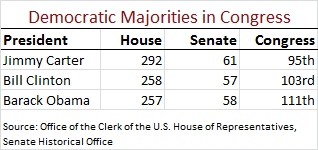Haley Barbour accused a fellow governor of “amnesia,” claiming he was forgetting “the fact that Obama had the biggest Democratic majorities in Congress since Lyndon Johnson.” But it was actually Republican Barbour who was having a memory lapse. He forgot about the Democrats’ massive victories following Richard Nixon’s Watergate scandal.
Forgetting the ‘Watergate Babies’
During an exchange on CBS’ “Face the Nation,” Barbour, the Republican governor of Mississippi, responded to Maryland Gov. Martin O’Malley’s complaint that Republicans in Congress were impeding the president’s ability to create jobs. Barbour said that the Democratic governor was having “amnesia about the fact that Obama had the biggest Democratic majorities in Congress since Lyndon Johnson.” But Barbour’s forgetting his congressional history.
 There were two Democratic presidents after LBJ and before Obama: Jimmy Carter and Bill Clinton. Let’s go to the Senate and House historical tables to compare the Democratic majorities enjoyed by each president in his first term.
There were two Democratic presidents after LBJ and before Obama: Jimmy Carter and Bill Clinton. Let’s go to the Senate and House historical tables to compare the Democratic majorities enjoyed by each president in his first term.
Carter had larger Democratic majorities than Obama in both houses — even when you include independent senators Joe Lieberman of Connecticut and Bernie Sanders of Vermont, who both caucus with the Senate Democrats. Pennsylvania Sen. Arlen Specter’s switch to the Democratic Party gave Obama 58 Democratic senators — but, more importantly, 60 votes (counting the two independent senators). Still, Carter had larger majorities in both houses. Clinton had a larger majority in the House, but not the Senate.
O’Malley’s Economic Spin
For O’Malley’s part, the Maryland governor buffed and muffed some economic facts, nationally and in New Jersey. O’Malley was wrong when he said “foreclosures are at their lowest level in 44 months.” That was true in July. But RealtyTrac reported that the foreclosure rate jumped 7.21 percent in August.
O’Malley also criticized New Jersey Gov. Chris Christie over his job-creation record, saying “unemployment in New Jersey is one of the higher unemployment rates in the country at 9.4 percent.” It’s true that the jobless rate in New Jersey is above the national average (which is 9.1 percent), but not by much. At 9.4 percent, New Jersey still fares better than 14 other states — including nine that have double-digit unemployment rates, ranging from Nevada (13.4 percent) to Georgia (10.2 percent).
O’Malley was correct when he noted that New Jersey created no net jobs last year. The state has lost 1,112 jobs since Christie took office. But the state’s unemployment rate has fallen from 9.8 percent in January 2010 to 9.4 percent in August 2011. How did the unemployment rate go down when jobs lost went up? During the same time, the state’s labor force declined by 20,659 people.
— Michael Morse, with Eugene Kiely